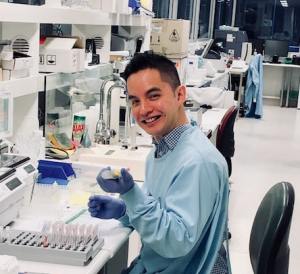Secondary haemophagocytic lymphohistiocytosis due to checkpoint inhibitor therapy
Dr Collin Chin is a Clinical Haematology Fellow at the University of Texas MD Anderson Cancer Center in Houston, Texas. He graduated in Medicine from the University of Western Australia in 2011 and completed his specialist training at Sir Charles Gairdner Hospital, Perth followed by an Aggressive Lymphoma & Chimaeric Antigen Receptor (CAR) T-cell therapy fellowship at Peter MacCallum Cancer Centre in Melbourne, Victoria.
“Our ‘Secondary haemophagocytic lymphohistiocytosis due to checkpoint inhibitor therapy’ paper highlights a case of haemophagocytic lymphohistiocytosis (HLH), a rare but important complication of checkpoint inhibitor (CI) therapy which are widely used in the treatment of solid organ and haematological malignancies. We present a case report, diagnostic work-up, associated challenges in management and review the existing literature regarding HLH secondary to CI therapy. Our findings suggest that treatment discontinuation and high-dose corticosteroid therapy without chemotherapy may be sufficient in treating HLH related to CI therapy.” (Quote by Dr Chin 31/05/19)

Collin has a specialist interest in the management of aggressive & indolent lymphoproliferative disorders, early phase clinical trials and immune effector cell (IEC) therapies including bispecific antibodies & CAR T-cell therapies. He has expertise in CAR T-cell therapy in high-risk and/or relapsed DLBCL & follicular lymphoma,
ha ving treated the first patients to receive CAR T-cells in Australia at the Peter MacCallum Cancer Centre. Collin has also co-authored the CAR T-cell referral pathway & toxicity management guidelines at the Peter MacCallum Cancer Centre.
ving treated the first patients to receive CAR T-cells in Australia at the Peter MacCallum Cancer Centre. Collin has also co-authored the CAR T-cell referral pathway & toxicity management guidelines at the Peter MacCallum Cancer Centre.
After completing his fellowship at the MD Anderson Cancer Center, Collin’s plan is to return to Perth and establish an immune effector cell (IEC) therapy unit for the treatment of high risk, relapsed and/or refractory lymphoproliferative disorders in Western Australia.
